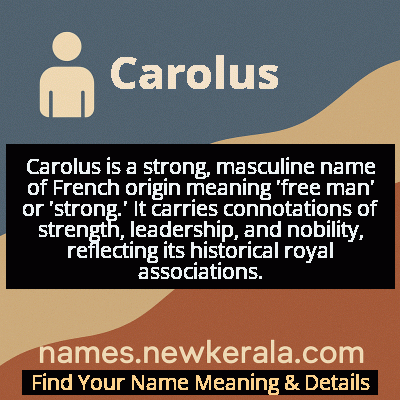Carolus Name Meaning & Details
Origin, Popularity, Numerology Analysis & Name Meaning of Carolus
Discover the origin, meaning, and cultural significance of the name CAROLUS. Delve into its historical roots and explore the lasting impact it has had on communities and traditions.
Name
Carolus
Gender
Male
Origin
French
Lucky Number
8
Meaning of the Name - Carolus
Carolus is a strong, masculine name of French origin meaning 'free man' or 'strong.' It carries connotations of strength, leadership, and nobility, reflecting its historical royal associations.
Carolus - Complete Numerology Analysis
Your Numerology Number
Based on Pythagorean Numerology System
Ruling Planet
Saturn
Positive Nature
Ambitious, efficient, realistic, and authoritative.
Negative Traits
Materialistic, stressed, confrontational, and can be overly ambitious.
Lucky Colours
Dark blue, black.
Lucky Days
Saturday.
Lucky Stones
Blue sapphire, amethyst.
Harmony Numbers
2, 4, 6.
Best Suited Professions
Business leaders, managers, financial services, law enforcement.
What People Like About You
Leadership, determination, organizational skills.
Famous People Named Carolus
Carolus Linnaeus
Botanist and Physician
Father of modern taxonomy, established binomial nomenclature system
Carolus Clusius
Botanist
Pioneer of tulip cultivation in Europe and founder of the Hortus Botanicus Leiden
Carolus-Duran
Painter
Renowned French academic painter and teacher of many notable artists
Carolus Magnus (Charlemagne)
King and Emperor
United much of Western Europe and initiated the Carolingian Renaissance
Name Variations & International Equivalents
Click on blue names to explore their detailed meanings. Gray names with will be available soon.
Cultural & Historical Significance
The name's association with the Carolingian Renaissance positioned it as a bridge between classical learning and medieval European culture, making it a favored choice among nobility and scholars alike. Its continued use in academic and royal contexts maintained its prestige across centuries, while in French culture specifically, it embodies a connection to both classical education and national history. The name carries the weight of centuries of European civilization, representing ideals of enlightened rulership, cultural preservation, and intellectual achievement that continue to resonate in modern times.
Extended Personality Analysis
Individuals named Carolus are typically perceived as strong-willed, intellectually curious, and naturally authoritative. They often exhibit leadership qualities combined with a deep appreciation for knowledge and tradition, reflecting the name's royal and scholarly heritage. These individuals tend to be methodical in their approach to challenges, demonstrating both practical wisdom and strategic thinking that enables them to navigate complex situations with confidence and precision.
Their strength of character is often balanced by a sense of responsibility and commitment to their principles, making them reliable and respected figures in their communities. The historical weight of the name seems to inspire a sense of purpose and determination in those who bear it, often driving them toward significant achievements in their chosen fields while maintaining a dignified and composed demeanor. They typically value structure and order, yet possess the flexibility to adapt when necessary, combining traditional values with modern insights in a way that makes them effective in both conservative and progressive environments.
Modern Usage & Popularity
In contemporary times, Carolus remains a distinguished but uncommon choice, primarily used in academic, aristocratic, or historically-conscious families, particularly in France and other European countries. While its popularity has declined compared to its vernacular forms like Charles, it maintains a niche appeal among parents seeking a name with classical gravitas and intellectual connotations. The name experiences occasional revivals during periods of renewed interest in historical and Latin names, often chosen by families with academic backgrounds or those appreciating its royal heritage. In modern France, it's considered an elegant, traditional alternative to the more common Charles, conveying both sophistication and historical depth while remaining accessible through its familiar sound and established variants across European languages.
Symbolic & Spiritual Meanings
Symbolically, Carolus represents strength, wisdom, and enduring legacy. The name carries connotations of leadership and intellectual authority, reflecting its historical association with kingship and scholarly achievement. It symbolizes the bridge between classical tradition and modern innovation, embodying the ideal of enlightened leadership that characterized the Carolingian Renaissance. Metaphorically, Carolus suggests a person who combines practical strength with intellectual depth—someone who builds lasting institutions and advances knowledge while maintaining moral integrity. The name also symbolizes cultural continuity, representing the transmission of learning and civilization across generations, making it emblematic of both personal strength and cultural stewardship in a way that transcends individual achievement to encompass broader historical and societal contributions.

